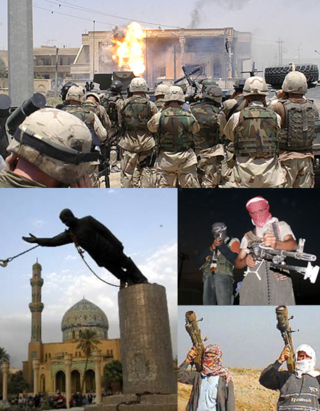
Donald Henry Rumsfeld was an American politician, government official and businessman who served as Secretary of Defense from 1975 to 1977 under president Gerald Ford, and again from 2001 to 2006 under President George W. Bush. He was both the youngest and the oldest secretary of defense. Additionally, Rumsfeld was a four-term U.S. Congressman from Illinois (1963–1969), director of the Office of Economic Opportunity (1969–1970), counselor to the president (1969–1973), the U.S. Representative to NATO (1973–1974), and the White House Chief of Staff (1974–1975). Between his terms as secretary of defense, he served as the CEO and chairman of several companies.
The Office of Strategic Influence, or OSI, was a department created by the United States Department of Defense on October 30, 2001, to support the War on Terrorism through psychological operations in targeted countries, which did not include the United States because the Pentagon is barred from PSYOPs in the U.S. However, BBC noted that "there is nothing to stop an American newspaper picking up a story carried abroad" in cases of news stories that were "black propaganda" with deliberately "misleading" information planted by the Pentagon under OSI.

The Rendon Group is a public relations firm headed by John Rendon.

Peter Gregg Arnett is a New Zealand-born American journalist. He is known for his coverage of the Vietnam War and the Gulf War. He was awarded the 1966 Pulitzer Prize in International Reporting for his work in Vietnam from 1962 to 1965, mostly reporting for the Associated Press.
On April 8, 2003, three locations in Baghdad housing journalists were fired upon by U.S. armed forces during 2003 invasion of Iraq, killing three journalists and wounding four.

Ahmed Abdel Hadi Chalabi was an Iraqi politician, a founder of the Iraqi National Congress (INC) who served as the President of the Governing Council of Iraq and a Deputy Prime Minister of Iraq under Ibrahim al-Jaafari.

The 2003 invasion of Iraq involved unprecedented U.S. media coverage, especially cable news networks.

The Occupation of Iraq (2003–2011) was characterized by a large United States military deployment on Iraqi territory, beginning with the US-led invasion of the country in March 2003 which overthrew the Ba'ath Party government of Saddam Hussein and ending with the departure of US troops from the country in 2011. Troops for the occupation came primarily from the United States, the United Kingdom, and Australia, but 29 other nations also provided troops, and there were varying levels of assistance from Japan and other countries, as well as tens of thousands of private military company personnel.

The Nayirah testimony was false testimony given before the United States Congressional Human Rights Caucus on October 10, 1990, by a 15-year-old girl who was publicly identified at the time by her first name, Nayirah. In her testimony, Nayirah claimed that after the Iraqi invasion of Kuwait she had witnessed Iraqi soldiers take babies out of incubators in a Kuwaiti hospital, remove the incubators and leave the babies to die. The testimony was widely publicized and was cited numerous times by U.S. senators and President George H. W. Bush in their rationale to support Kuwait in the Gulf War.
Academi, formerly known as Blackwater, is an American private military contractor founded on December 26, 1996, by former Navy SEAL officer Erik Prince. It was renamed Xe Services in 2009, and was again renamed to Academi in 2011, after it was acquired by a group of private investors. In 2014, Academi merged with Triple Canopy to form Constellis Holdings.
The Saddam–al-Qaeda conspiracy theory was based on false claims made by the United States government, alleging that a highly secretive relationship existed between Iraqi president Saddam Hussein and the Sunni pan-Islamist militant organization al-Qaeda between 1992 and 2003. The George W. Bush administration promoted it as a main rationale for invading Iraq in 2003.

DoD News Channel was a television channel broadcasting military news and information for the 2.6 million members of the U.S. Armed Forces. It was widely available in the United States as a standalone television channel, or as part of programming on local PEG cable television channels. It could be viewed FTA in most Central and Western European countries, Africa, the Americas and most of Asia via satellite, and globally via the Internet. DoD News Channel was free, in the public domain, and accessible 24/7 to all U.S. cable and satellite providers.

In the United States, propaganda is spread by both government and non-government entities. Throughout its history, to the present day, the United States government has issued various forms of propaganda to both domestic and international audiences. The US government has instituted various domestic propaganda bans throughout its history, however, some commentators question the extent to which these bans are respected.

The Iraq War was a protracted armed conflict in Iraq from 2003 to 2011. It began with the invasion of Iraq by the United States-led coalition that overthrew the Ba'athist government of Saddam Hussein. The conflict continued for much of the next decade as an insurgency emerged to oppose the coalition forces and the post-invasion Iraqi government. US troops were officially withdrawn in 2011. The United States became re-involved in 2014 at the head of a new coalition, and the insurgency and many dimensions of the armed conflict are ongoing. The invasion occurred as part of the George W. Bush administration's war on terror following the September 11 attacks.

Psychological operations (PSYOP) are operations to convey selected information and indicators to audiences to influence their motives and objective reasoning, and ultimately the behavior of governments, organizations, groups, and large foreign powers.

Rick Francona is an author, commentator and media military analyst. He is a retired United States Air Force intelligence officer with experience in the Middle East, including tours of duty with the National Security Agency, the Defense Intelligence Agency and the Central Intelligence Agency. He was under contract to NBC News and appeared regularly on NBC, MSNBC and CNBC, as well as Radio Canada and other media. In 2013, he became a military analyst with CNN.
The Pentagon rapid response operation was a public relations initiative by the United States Department of Defense to "quickly respond to news media stories critical of ... the Iraq War, as well as other stories the Defense Department leadership doesn't like."

The Wolf Brigade, since 2006 officially Freedom Brigade, is a unit of roughly 2,000 special commando police officially under the Iraqi Ministry of the Interior.

The Pentagon military analyst program was a propaganda campaign of the U.S. Department of Defense (DoD) that was launched in early 2002 by then-Assistant Secretary of Defense for Public Affairs Victoria Clarke. The goal of the operation is "to spread the administration's talking points on Iraq by briefing retired commanders for network and cable television appearances," where they have been presented as independent analysts; a Pentagon spokesman said the Pentagon's intent is to keep the American people informed about the so-called War on Terrorism by providing prominent military analysts with factual information and frequent, direct access to key military officials. The Times article suggests that the analysts had undisclosed financial conflicts of interest and were given special access as a reward for promoting the administration's point of view. On 28 April 2008, the Pentagon ended the operation. A DoD Inspector General investigation found no wrongdoing on the part of the DoD.
The Persian Gulf War, codenamed Operation Desert Storm and commonly referred to as the Gulf War, was a war waged by a United Nations-authorized coalition force from 34 nations led by the United States against Iraq in response to Iraq's invasion and annexation of Kuwait. Media coverage of the Gulf War was significant for many reasons including CNN's live reporting from a Baghdad hotel, alternative and international coverage, and the use of images.













